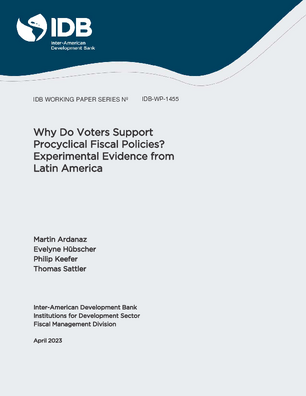Why Do Voters Support Procyclical Fiscal Policies? Experimental Evidence from Latin America
Date
Apr 2023
Governments often pursue procyclical fiscal policies, even though they reduce voter welfare. Is this because voters actually prefer procyclical policies? The analysis in this paper exploits the first individual-level evidence from an original survey of 12,000 respondents in 8 countries across Latin America. Prior research links support for procyclical policy to imperfect voter information but does not explore voter knowledge of the composition of public spending increases and cuts in response to positive and negative shocks. We present experimental evidence that less informed individuals are more supportive of procyclical policy. Previous work also explores how trust in politicians influences fiscal policy preferences. We find that those who distrust politicians support acyclical fiscal policies: they are skeptical that they will benefit from higher government spending after positive shocks and be spared the costs of spending cuts after negative shocks. Finally, the evidence supports untested assumptions about voter patience and risk aversion. Patient respondents care more about the future costs of procyclical policy and risk-averse respondents about its higher volatility; support for acyclical policy is correspondingly higher among both groups.




